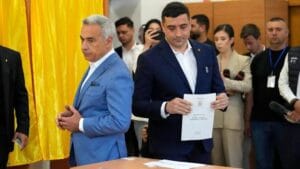Iran pledges reaction to Western sanctions over Russian missile supply
Iran has fiercely condemned new sanctions imposed by Western nations over allegations it supplied ballistic missiles to Russia for use in Ukraine.

Iran has fiercely condemned new sanctions imposed by Western nations over allegations it supplied ballistic missiles to Russia for use in Ukraine.
Tehran, which faces some of the toughest sanctions globally, dismissed the accusations as “baseless” and promised to take retaliatory action against Britain, France, and Germany, who were the latest to impose restrictions on Iran.
Iran’s Foreign Minister, Abbas Araghchi, on Wednesday refuted claims that Tehran had transferred ballistic missiles to Moscow, calling the allegations a result of “faulty intelligence” by the United States and its allies. “Any claim that the Islamic Republic of Iran has sold ballistic missiles to the Russian Federation is completely baseless and false,” Araghchi declared on social media platform X. He also questioned the logic behind sanctioning Iran’s arms industry, sarcastically remarking, “Sanctions addicts should ask themselves: how is Iran able to make and supposedly sell sophisticated arms? Sanctions [are] NOT a solution, but part of the problem.”
This statement followed a strongly-worded response from Foreign Ministry spokesman Nasser Kanaani, who earlier referred to the new sanctions as “economic terrorism” targeting Iran’s people. “The three European countries will face appropriate and proportionate action,” Kanaani vowed, signaling Tehran’s readiness to retaliate.
The sanctions, introduced by the United Kingdom, France, and Germany, came after the United States formally accused Iran of providing missiles to Russia. In a joint statement, the European nations confirmed the measures would include the revocation of bilateral air service agreements with Iran and sanctions on its national airline, Iran Air. The restrictions are set to severely limit the airline’s ability to operate flights to Europe. “In addition, we will pursue the designations of significant entities and individuals involved with Iran’s ballistic missile programme and the transfer of ballistic missiles and other weapons to Russia,” the statement read.
On Tuesday, U.S. Secretary of State Antony Blinken, during a visit to London, announced that Russia had already received Iranian ballistic missiles and warned that Moscow could deploy them in Ukraine within weeks. Blinken described the growing military cooperation between Tehran and Moscow as a “direct threat” to European security and noted that Russian military personnel had been trained in Iran on the use of Fath-360 missiles, which have a range of 120 kilometers (75 miles).
Britain’s Foreign Office also escalated diplomatic tensions by summoning Iran’s charge d’affaires in London on Wednesday, delivering a strong warning that any transfer of missiles to Russia would be viewed as a “dangerous escalation” that would provoke a “significant response.”
In response to these escalating accusations, Iran’s Foreign Ministry spokesman Kanaani accused Western countries of hypocrisy, suggesting that their arms support to Israel in the Gaza conflict was being concealed behind the missile allegations. “Reports on the alleged transfers are ugly propaganda used to distract from the large illegal arms support of the United States and some Western countries for the genocide in Gaza,” Kanaani wrote on X.
While Iran has denied sending missiles, its Shahed drones have been well-documented as playing a role in the Russian invasion of Ukraine. As Tehran and Moscow grow closer in the wake of Russia’s isolation, their military ties continue to raise alarms across Western capitals.
However, some experts question the effectiveness of the new sanctions. Iran has already endured years of economic isolation, and additional measures may hit the country’s middle class harder than its leadership. Yet, with Iran’s government adamant about defending its defense ties and the West determined to curb Iranian-Russian cooperation, the confrontation shows no signs of de-escalating.










